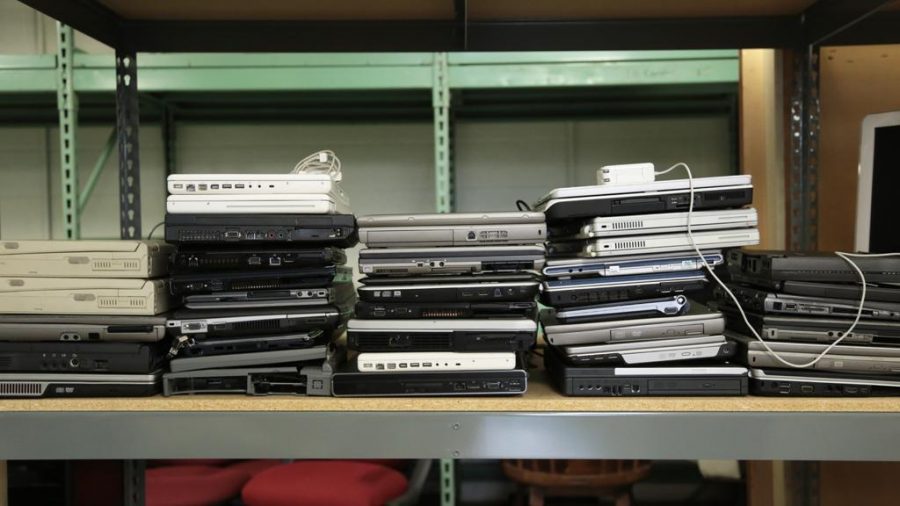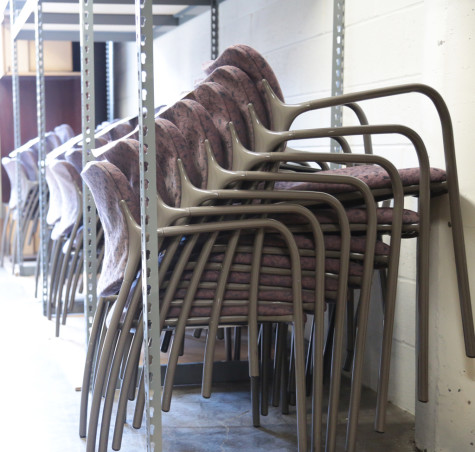If you’re tired of sleeping on your extra large twin bed, you can replace it with a used 78X30X31 massage table for a bargain of a price.
No, you won’t find it cast aside on an Atwood sidewalk. It’s waiting for you at Pitt Surplus for a low price of only $100.
If the table doesn’t fulfill your shopping fancy, you can bid on a grill, milk dispenser or bulk packages of Purell hand sanitizer, all pre-loved by Pitt and waiting for purchase.
Pitt Surplus serves as the University’s departmental thrift store, collecting used items from any campus department. Its website boasts 21 VHS players, 11 pieces of cooking equipment, seven Pitt football plaques, six mail sorters and one Edward Healy piano — just to list a few items.
Tom Heidkamp, the Pitt Surplus property manager, said the warehouse receives “hundreds and hundreds” of items every week from all of Pitt’s campuses. Pitt Surplus tags the items that pass inspection and posts them in the online inventory on its website, where students, faculty and the general public can shop around for secondhand items.
Pitt Surplus is about a 15-minute drive from Pitt’s central campus, but familiar blue and gold Pitt signs will denote your arrival. Pitt Surplus shares the medium sized warehouse with the Archives Service Center, which stores documents from Pittsburgh’s and Pennsylvania’s histories.
The surplus’s reception area boasts two life-size cutouts of Roc, the panther, and old photos of Pitt football games decorate the conference room. In the back, used computers, lab equipment and furniture stack the warehouse shelves, occasionally spilling into the narrow aisles. From keyboards, speakers, couches from dorm lounges and Market Central dining chairs, this is the land of a previous Pitt, ready for action and new lives after purchase.
The computer science department regularly takes advantage of what Pitt Surplus has to offer, both by sending over used items and purchasing new-to-them items, according to Karen Dicks, the secretary to the department chair in the computer science department.
“I personally try there first if I need something,” Dicks said. “They have matching desks and things to what we already have, so it’s a lot easier.”
At the warehouse, any donated items that are no longer usable are recycled or scrapped for parts. Any item that still has life in it undergoes an inspection and minor cleaning and repairs.
If a department at Pitt wants to buy an item another department donated, Pitt Surplus gives that department a steep discount, Heidkamp said.
“A large portion of the furniture is reissued back to the University departments in lieu of them buying new,” Heidkamp said. “It could be up to a 95 percent discount, depending on the item and the condition of it.”
Departments that utilize Pitt Surplus also have the chance to raise money from their unwanted furniture. When an item from Pitt Surplus sells for more than $100, the department that donated the item receives a 25 percent credit of the proceeds, while Pitt Surplus absorbs the remainder of the proceeds for its cost of pickup, minor repairs, storage and sale of the item. Any item that sells for more than $2,000 earns the department that donated the item a credit of at least 80 percent of the proceeds.
Pitt Surplus also provides a hard drive destruction service to ensure that any departmental computers are clean of sensitive information. So if you were looking to find the secret recipe to Market’s stir-fry sauce lodged in an old school Mac — move on.
For Pitt students and the general public, there may be haggle room on an item’s price, but there’s no budging on the item’s condition.
“Everything is sold as is, where is,”
Heidkamp said. “Which means that students, once they pay for it, they get a receipt, and then they make their own arrangements to get it out.”
Pitt’s mass of unwanted items is just a speck on the map of unwanted university supplies around the nation. The department is a member of the University Surplus Property Association, a nationwide organization of surplus programs, including those at Penn State and Temple University.
Penn State’s surplus program, Lion Surplus, is set up similarly to Pitt Surplus in that it passes the university’s used furniture on to other departments rather than throwing it away.
Glenn Feagley, the manager of Lion Surplus, said its main goal is to “try to keep items out of the landfills.”
The Lions and the Panthers team up to increase the available merchandise, according to Heidkamp. Although natural enemies in the wild, these thrifty animals are partners in the resale business and often sell equipment to one another.
“We use each other all year long to find homes for equipment,” Heidkamp said. “So if we have a specialized piece of equipment and we can’t sell it, maybe another university has sold it, and they’ll give us referrals.”
Not every university, however, sells surplus to outside buyers.
Kathleen Grady, the director of sustainability at Temple University, said its surplus program is mainly a way to reissue equipment among the various departments.
“The Pitt surplus program is revenue generating, and ours is a little different,” Grady said. “We have surplus, but it is not for sale. It is for use by other departments.”
Temple, too, donates old equipment to nearby charitable organizations. However, Grady said Temple is hoping to expand its surplus program to incorporate an online component like that of Pitt Surplus.
“We actually really look at Pitt as a model surplus program,” Grady said.
Not just a warehouse of used goods, Pitt surplus is an industry model, setting an environmentally friendly standard.
“We’re a green facility,” Heidkamp said. “It’s the nature of our business.”




